Will Engel is no longer the Route 20 Chess Club's newest member -- several players joined at the tournament -- but he's still our toughest. Here's his game against second-place open finisher Kelsen Alexander of Madison, his only draw alongside two wins.
K.Alexander–W.Engel
National Chess Day Delayed Blast
Freeport, Ill., Oct. 23, 2010
1.d4 d5 2.c4 e6 3.Nc3 Bb4
Strong grandmasters have played 3...B4, including Lautier, Ehlvest and Korchnoi. However, none of them has a winning record with it. In most cases, white simply ignores the bishop and continues developing with 4.Nf3.
4.Bd2 Nf6 5.Nf3 c5 6.e3 Nc6 7.Qa4
7...Bd7 8.dxc5 Bxc5 9.cxd5 exd5 10.Bb5
Black, about to castle, is looking a little better here. White can subtly refocus his line of fire by way of 10.Qb3 d4 11.exd4 Nxd4 12.Nxd4 Bxd4, maintaining equality.
10...0-0 11.0-0 Rc8 12.Rac1 Re8
Now's a good moment to kick the bishop with 12...a6.
13.Nxd5
Clever. Although it's probable that black will recapture with the king's knight, if for some reason he doesn't, 14.Ba5! traps the queen.
13...Nxd5
The obvious play, but there's also 13...Ne4!?, simultaneously attacking the d2-bishop and defending the c5-bishop.
14.Rxc5
It's looking good for Kelsen.
14...Nb6 15.Qc2 a6 16.Bxc6 Bxc6
Better to recapture with the rook, 16...Rxc6 17.Rc1 Qe7.
17.Ne5??
This move leaves Kelsen vulnerable to a slick king-exposing attack by which black can restore equality: 17...Bxg2 18.Kxg2 Rxe5 (the white rook on c5 is pinned) 19.Rxc8 Nxc8 (not 19...Qxc8 20.Qxc8 Nxc8 21.Rc1, which is still better for white). It also passes up a chance to take advantage of his pieces' activity, 17.Ng5 g6 18.Ba5.
17...Re6??
The idea behind Will's move is unclear.
18.Rd1??
Kelsen still isn't seizing the moment. Having brought his knight to e5, and being a pawn ahead, it makes sense for him to trade down with 18.Nxc6 Rexc6 19.Rxc6 Rxc6.
18...Qf6??
Better for Will is an exchange sacrifice that pulls Kelsen's rook off the c-file, 18...Rxe5! 19.Rxe5, followed up by 19...Ba4!, a double attack on Kelsen's queen. The only answer that keeps Kelsen in the game is to trade queens with a discovered attack of his own: 20.Ba5 Bxc2 21.Rxd8+ Rxd8. No matter what, he loses a rook, and Will remains at least a piece ahead.
19.Bc3 Na4??
Overlooking a potential discovered attack on his queen: 20.Nxc6! Nxc5 21.Bxf6 Rexc6 22.Bc3.
20.Nd7
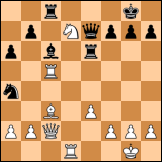
Also overlooking the discovered attack! Nevertheless, it's looking bad for Will right now. Even his best move, 20...Qe7 (diagram), allows Kelsen a remarkable tactic. Can you spot it? (Highlight to reveal answer.)
21.Qxa4! can't be retaken -- at least, not immediately. If black tries, he loses his own queen as well: 21...Bxa4?? 22.Rxc8+ Qe8 23.Rxe8+ Rxe8. The necessary reply is 21...Qxc5 22.Nxc5 Bxa4 23.Nxa4, after which black has a rook against a bishop and a knight -- far from ideal, but better than being down a whole piece.
20...Qg6
Not significantly worse than 20...Qe7.
21.Qxg6
It may not look it, but this is a gift to Will. 21.Rxc6! Rexc6 22.Qxa4, threatening the fork 23.Ne5, keeps a tight grip on the initiative; if 22...Qe6, then 23.Qd4 uses the threat of mate to win other concessions -- for example, 23...Rxc3 24.bxc3. Black's best hope is 23...f6 24.Qd5 Kf7 25.e4 Qxd5 26.Rxd5 (not 26.exd5?? Rd6, trapping white's knight). The problem is that even after the queens are traded, Will's rook can still punch a hole in Kelsen's king defense, seizing back the initiative and potentially picking up the loose rook on c5.
21...Rxg6 22.Rc4?
Kelsen clings to his rook at the expense of his king's safety. 22.g3!? Nxc5 23.Nxc5 is unfortunately necessary.
22...Rxg2 23.Kf1 Nxc3
Lets Kelsen off the hook somewhat. 23...Rxh2 is a freebie, and can be followed by 24.Nf6+ Kh8 25.Ne4 Rh1+ 26.Ke2 Bb5 27.Kf3 Bxc4 28.Rxh1. After 28...Bd5 29.Rd1 Nxc3 30.bxc3 Bxa2, there's not much hope remaining for white.
24.Rxc3 Rxh2 25.Ke2 h5 26.Ne5 Bb5+ 27.Kf3 Rxc3 28.bxc3 Rh4 29.Rd8+
Kelsen hangs on tenaciously.
29...Kh7 30.Nxf7 Bc6+ 31.Ke2 g6 32.Ne5 Bb5+ 33.Kf3 Ra4 34.Rd6
Pressuring the backward pawn on g6 . . .
34...Rxa2 35.Nxg6
. . . but just because the pressure is there doesn't mean it has to be used right away. Kelsen can keep it even with 35.c4!? Bc6+ 36.Nxc6 bxc6 37.Rxc6.
35...Rc2
Chipping away at Kelsen's foundation.
36.Nf4 a5 37.Rb6?
A stumble on the tightrope. Kelsen is best off giving his king more freedom of movement with 37.Ke4.
37...Bc6+ 38.Kg3 h4+
Unnecessary when 38...a4!? 39.Nxh5 Rxc3 is available.
39.Kxh4
39...Rxf2
The last window of opportunity closes on that poor passed pawn.
40.Nd3 Re2 41.Ne5 Be4 42.Nc4 a4
Too late for that.
43.Nd6 Rxe3 44.Nxe4 Rxe4+ 45.Kg3 Re3+ 46.Kf4 Rxc3 47.Rxb7+ Kg6 48.Ke4 a3 49.Ra7 Kf6 50.Kd4 Rb3 51.Kc4 ½-½
Congratulations to Will and to second-place finishers Kelsen and Gary Sargent, and to RBO winners R.J. Swedlow, Zach Woll and Taylor Soddy, who won third place on a modified-median tiebreak -- he was one of seven players who finished with a 3.0 score. Congratulations also to the dozen participants playing USCF-rated chess for the first time, and thanks to Monica Kearney for handling the lunch orders. See event pictures on our Photos page and complete crosstables on our Tournament Results page.

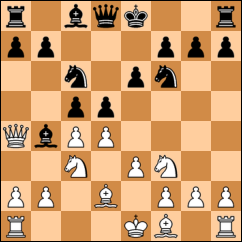
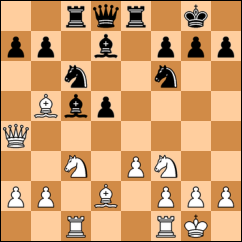
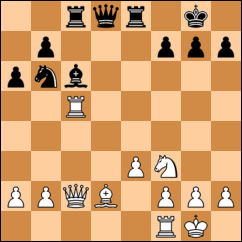

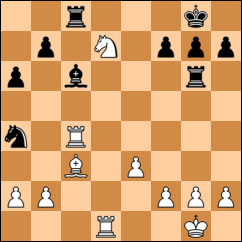
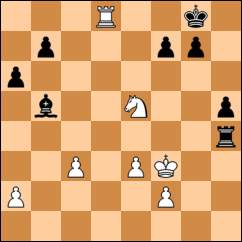
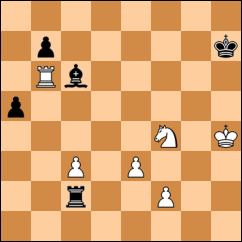



0 comments:
Post a Comment